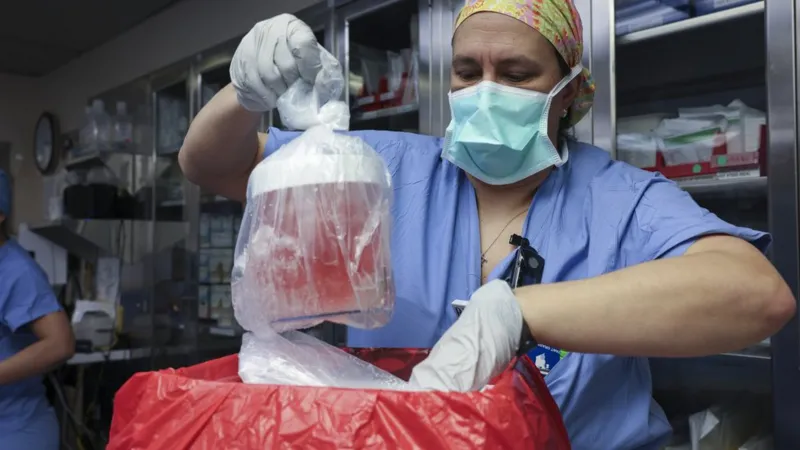Successful Pig Kidney Transplant Recipient Discharged from Hospital
The first man to undergo a genetically modified kidney transplant from a pig has been discharged from the hospital. The 62-year-old patient, Richard “Rick” Slayman of Weymouth, Massachusetts, was sent home on Wednesday, marking two weeks since the groundbreaking surgery took place at Massachusetts General Hospital (MGH) in Boston, United States.
This achievement holds significant importance in the field of transplantation, as previous attempts at organ transplants from genetically modified pigs had been unsuccessful. However, the success of this procedure has been lauded by scientists as a historic milestone.
Mr. Slayman, who had been battling end-stage kidney disease, received the genetically-edited pig kidney during a four-hour surgery on 16 March. Following the transplant, his kidney is reported to be functioning well, and he no longer requires dialysis.
Expressing his gratitude, Mr. Slayman stated that being discharged from the hospital and returning home was one of the happiest moments of his life. He looks forward to spending time with his family and loved ones without the burden of dialysis that had impacted his quality of life for many years.
Previously, Mr. Slayman had undergone a human kidney transplant from a deceased donor in 2018, which began to fail last year. Subsequently, doctors suggested the possibility of a pig kidney transplant, which Mr. Slayman saw not only as a personal opportunity but also as a beacon of hope for thousands of others awaiting transplants.
The pig kidney used in the transplant had been genetically modified by the pharmaceutical company eGenesis to remove harmful pig genes and introduce certain human genes to enhance compatibility with humans.
The procedure received authorization from the Food and Drug Administration (FDA) under an Expanded Access Protocol, allowing access to experimental treatment for patients with life-threatening illnesses. This transplant offers potential solutions to the global organ shortage, particularly benefiting ethnic minority communities disproportionately affected by the shortage.
Dr. Winfred Williams, Mr. Slayman’s doctor at MGH, hailed the transplant as a historic advancement that could address health equity issues and provide a viable solution to kidney failure.
While this marks the first successful pig kidney transplant into a human, it is not the first instance of pig organs being used in transplant procedures. Previous attempts at pig heart transplants were unsuccessful, highlighting the challenges associated with organ rejection in transplants. Nonetheless, the success of Mr. Slayman’s procedure offers hope for future advancements in transplantation technology and addressing the critical need for organ donors.
The first man to undergo a genetically modified kidney transplant from a pig has been discharged from the hospital. The 62-year-old patient, Richard “Rick” Slayman of Weymouth, Massachusetts, was sent home on Wednesday, marking two weeks since the groundbreaking surgery took place at Massachusetts General Hospital (MGH) in Boston, United States.
This achievement holds significant importance in the field of transplantation, as previous attempts at organ transplants from genetically modified pigs had been unsuccessful. However, the success of this procedure has been lauded by scientists as a historic milestone.
Mr. Slayman, who had been battling end-stage kidney disease, received the genetically-edited pig kidney during a four-hour surgery on 16 March. Following the transplant, his kidney is reported to be functioning well, and he no longer requires dialysis.
Expressing his gratitude, Mr. Slayman stated that being discharged from the hospital and returning home was one of the happiest moments of his life. He looks forward to spending time with his family and loved ones without the burden of dialysis that had impacted his quality of life for many years.
Previously, Mr. Slayman had undergone a human kidney transplant from a deceased donor in 2018, which began to fail last year. Subsequently, doctors suggested the possibility of a pig kidney transplant, which Mr. Slayman saw not only as a personal opportunity but also as a beacon of hope for thousands of others awaiting transplants.
The pig kidney used in the transplant had been genetically modified by the pharmaceutical company eGenesis to remove harmful pig genes and introduce certain human genes to enhance compatibility with humans.
The procedure received authorization from the Food and Drug Administration (FDA) under an Expanded Access Protocol, allowing access to experimental treatment for patients with life-threatening illnesses. This transplant offers potential solutions to the global organ shortage, particularly benefiting ethnic minority communities disproportionately affected by the shortage.
Dr. Winfred Williams, Mr. Slayman’s doctor at MGH, hailed the transplant as a historic advancement that could address health equity issues and provide a viable solution to kidney failure.
While this marks the first successful pig kidney transplant into a human, it is not the first instance of pig organs being used in transplant procedures. Previous attempts at pig heart transplants were unsuccessful, highlighting the challenges associated with organ rejection in transplants. Nonetheless, the success of Mr. Slayman’s procedure offers hope for future advancements in transplantation technology and addressing the critical need for organ donors.










































Comment Template